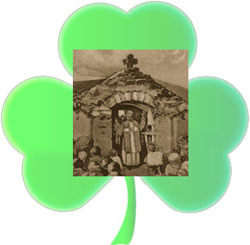The Bishop of Derry: a St. Patrick's Day Yarn
Updated March 10, 2013
This is about a Neal Conway who was born in Ballynascreen, Derry, Ireland around 1670. That was a hell of a time and place to be an Irish Catholic. Catholics under British rule eveywhere--including The Thirteen Colonies--suffered, but nowhere as they did in Ireland.
As part of an effort to dispossess and ultimately exterminate Irish papists, British rulers drove the church underground with laws forbidding the establishment of schools, the presence of bishops and of religious orders. The legality of being a priest and of attending Mass was always fuzzy. Liturgies were performed in secret, or at night, often with the celebrant concealed from the congregation so that they could not identify him. He likely hid his true name with a pseudonym anyway. The poor parishioners who gathered secretly in ruins to hear Mass had no money to support the priests; the fathers starved and went naked along with them.
During Neal's lifetime, the ownership of Irish land by Catholics was dropping from 60% to 5%.
However Irish, English, Scottish and Colonial Catholics' response to Anglo-Saxon oppression in the 16th-18th Centuries was one of the great adventures of The Counter-Reformation. Catholics with the will and ability--and oftentimes, wealth--fled to cities in the Low Countries and France where they studied in great universities and seminaries. Among these--so a theory has it--may have been William Shakespeare. Around 1600, exiled scholars in Douai and Rheims, France created the first English translation of the Catholic Bible.
Once ordained, the scholar-priests slipped secretly back into the British Isles as clandestine missionaries. Many such as Jesuits Robert Southwell and Edmond Campion met torture and execution.
The Orders of Preachers and of Friars Minor faced martyrdom as well. Not much is known about the Neal Conway of this story, but he became a priest and he may have been a Franciscan.
In Paris, sympathetic King Louis XV revived an ancient college as a seminary for Irish expatriots. It had been originally named The House of Poor Italian Scholars of the Charity of The Blessed Virgin, but by 1700 it was known as The College of The Lombards.
Fr. Neal Conway spent many decades in Paris living at the college. At one point he was its procurator. He also studied and taught at 'The Sorbonne," The University of Paris, the world's oldest such institution, where Thomas Aquinas had lectured centuries earlier.
However the course of his vocation would not permit Fr. Conway to spend his middle and old age as a scholar in exile. In his forties, he slipped back into his native land as one of those underground clergy, ministering in secret.
Remember that bishops were totally forbidden on Irish soil in poena mortis. Nevertheless in 1727 Neal Conway was appointed Bishop of Derry and shepherded that diocese until his death of natural causes in 1739.
There is not much known about this man beyond what is written here, but I think that we may safely assume that the last dozen years of His Excellency Neal Conway's life were probably the most interesting.
 |
|---|
Copyright 2011, 2013 by Neal J. Conway. All rights reserved. |